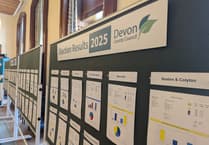South West Water (SWW) CEO Susan Davy has apologised to the people of Devon who “felt poorly” during last summer’s cryptosporidium outbreak.
Ms Davy, who is also the chief executive of SWW’s parent company, Pennon, made the comment while giving evidence on Tuesday (February 25) to a Parliamentary committee.
During a gruelling session that lasted for more than an hour, Ms Davy was quizzed over SWW’s handling of last year’s cryptosporidium outbreak, as well as the firm’s poor record on sewage spills and her £300,000 pay rise.
Some 17,000 households in the Kingswear, Hillhead and Brixham areas were put on boil notices after a parasite got into the tap water supply last May, causing about 100 reported cases of cryptosporidiosis, with dozens falling ill with vomiting and diarrhoea symptoms.
Ms Davy said she understood how devastating the incident had been for the community “and for the customers who were poorly...it was a really horrible time for them”.
Helena Dollimore MP asked why SWW had failed to issue the boil notice until 24 hours after the UK Health Security Agency (UKHSA) discovered the parasite.
She defended her company’s response, saying that water tests taken by SWW on Monday (May 13) had not detected the bug, but then acted on the Wednesday morning (May 15) when SWW’s own results showed that cryptosporidium was in the network.
Ms Dollimore said this was evidence that SWW’s testing procedures had failed.
“You did your own version of testing and thought there wasn't (cryptosporidium), left it too long and then issued the boil notice when a lot of people had already consumed the contaminated water,” she said.
Ms Dollimore also criticised Ms Davy for refusing to be interviewed by the media during the height of the crisis.
In response, she added: “In retrospect, perhaps it would have helped if I had spoken to the media, but at the time I thought it was the right thing to do.”
During the session, she was asked whether SWW had settled court claims with customers on condition they agreed to sign non-disclosure agreements (NDAs).
She said she did not have that information with her but that it was “not something that we do as a matter of course”.
Chair Alistair Carmichael MP reminded Ms Davy that SWW had been fined £2.1 million in 2023 over a string of pollution offences spanning over a four-year period.
He also noted that all sewage companies in 2023-24 were expected to have no more than 22.4 pollution incidents per 10,000 kilometres of sewer and not 111.24 as in SWW’s case.
Ms Davy countered by saying that SWW had reduced pollution to water courses in Devon and Cornwall to just over 70 per cent but that a 30 per cent increase in rainfall over the past two years had made a “significant impact” on pump and stations and treatment works.
Mr Carmichael rebutted her comments, quoting Environment Agency (EA) data which suggested that “only 12 per cent of them are due to increased rainfall”.
Ms Davy was also asked if she merited a high salary, which had been increased by about £300,000, and totalling £860,000.
In response, she said her pay was set not by her but by an independent committee, adding that she had a history of turning down bonuses.



Comments
This article has no comments yet. Be the first to leave a comment.